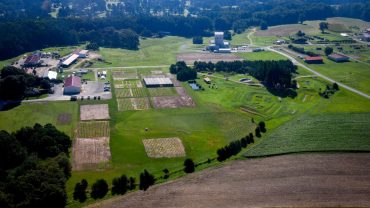Agricultural Business Management
The Undergraduate Certificate in Agricultural Business Management (ABM) is offered to any student enrolled as a non-degree studies (NDS) student at NC State University, and enrolled in a college degree program or has already received an associate degree. This 15-credit-hour certificate provides students an opportunity to learn basic business and economic principles that are useful in careers in agricultural and related industries.
The rapid change in agribusiness as an industry has accelerated in the past half-century and continues to grow and change. Agricultural technology is ever-evolving, as are seed, feed, production, sales techniques, strategies and methodologies. Global market demands are shifting, and as a result, laws and expectations related to sustainability and environmental impact are also changing. Experienced and novice agricultural business managers alike need the knowledge provided in the Undergraduate Certificate in Agricultural Business Management program.
Eligibility
- Must be currently enrolled in a 2-year or 4-year degree program at an accredited college or university and provide proof of a 2.5 GPA or higher; or must have received an associate degree from an accredited institution;
- Must not be enrolled in a 4-year degree program at NC State; students pursuing the certificate are classified as Non-Degree Studies (NDS) students at NC State;
- Must submit separate Undergraduate Certificate in Agricultural Business Management application, and official transcript, after being accepted as an NDS student. Please see "Program Contacts" for contact information to obtain an application after NDS acceptance.
Plan of Study
The certificate requires 15 credit hours, as well as a three-credit prerequisite course. Students pursuing certificate programs are considered non-degree studies (NDS) students for the purpose of university registration. NDS students may register for a maximum course load of two courses per semester. Thus, the certificate may be completed in as little as three semesters. This is a certificate program for undergraduate non-degree studies (NDS) students interested in agricultural business management. Requires 15 credit hours.
Completion Requirements: Completion of 15 credit hours from the list of required and elective courses with a grade of C- or higher received for each course and an overall GPA of 2.0 or higher must be achieved upon completion of all required courses. None of the required 15 credit hours may be taken for S/U or “credit only.” All courses must be 601 sections taken through distance education unless special approval is granted for completion of an on-campus section to allow the student to successfully complete the course sequence for receipt of the Undergraduate Certificate in Agricultural Business Management. No transfer credits from other institutions to fulfill certificate course requirements are allowed. Four (4) years will be allowed for completion of all courses. The time limit starts with enrollment in the first course. Students will be allowed to defer no more than two semesters after acceptance into the program.
Applicants currently enrolled in an associate's degree or bachelor's degree program at another university may apply to and be approved to enroll into the Undergraduate Certificate in Agricultural Business Management Program; however, before the certificate can be awarded, the student must complete the associate's degree or the bachelor's degree. Proof of receipt of the associate's degree or B.S. or B.A. degree should be provided by an updated official copy of applicant’s transcript from the degree conferring institution. This requirement must be fulfilled in addition to other certificate program requirements.
Career Prospects
Agricultural business managers are expected to handle a wide range of challenges related to overseeing the business side of running farms, greenhouses, ranches, or other agricultural operations. The financial aspect of this career path includes working with creditors to secure funding, planning and executing budgets, record keeping, and purchasing decisions. The day-to-day human managerial aspect of this career includes hiring and firing of employees, assignment and oversight of duties, and ensuring that livestock and crops receive adequate care. Common responsibilities include livestock, seed, or feed selection, as well as supervision of sales and profitability.

